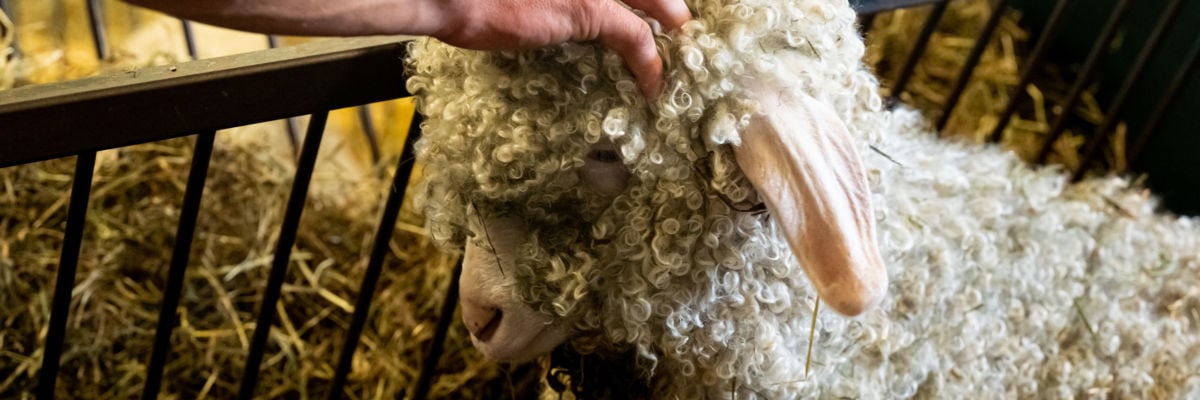
“The Lord is my shepherd.” Like so many Christians today, members of the early Church lingered over this image and treasured it. Some of the earliest examples of Christian art depict Christ the Good Shepherd. That in itself is an interesting fact, for we might imagine the early Christians focusing more on the Crucifixion, or the Nativity, or some other crucial event in the life of Jesus. But this image of the shepherd seems to have been particularly powerful, maybe because it sums up all those other things: we can trust the Good Shepherd because he has given his life for the sheep. He cares for us; he leads us; he protects us; he gives us nourishment.
Who are the “thieves and robbers” who come only to kill and steal? In the first instance, first-century Jews may have seen this as a reference to the false shepherds of Israel at the time. Under Roman occupation, Israel was ruled by, first, a distant emperor who cared little for the Jewish people; second, a puppet king whose claim to the throne of David was spurious; and third, a high priestly dynasty in the Temple who were, properly speaking, usurpers.
What about the thieves and robbers of our own time? On the surface, there’s no shortage of people claiming authority over us. The bad clerics of the Church who use their position for evil are of thieves and robbers, all the more insidious in their ability to erode our trust in the Church and her true and good shepherds. Likewise, the bad political leaders who use their position to promote immorality or hinder virtue are also thieves and robbers.
Yet I wonder if the greater “thief and robber” of our age isn’t a religious or political leader per se, but rather an idea—the idea that the true voice of the shepherd is really just myself, my own voice, leading me to do whatever I want. That seems to have become a popular way of talking about “conscience” in certain circles, both of the Catholic academic intelligentsia and portions of the college of bishops. In this way of thinking, “conscience” is the arbiter of all meaning; Catholic moral thinking just is in a simple way listening to “conscience,” which for these innovators is that inner voice which speaks to me about what is right and wrong. This idea of conscience, not a shepherd who speaks to me from the outside, is the only real authority in human behavior. So if the Church says something is objectively evil, or always wrong, I do not have to listen to it if my “conscience” gives me a different opinion.
The Catechism of the Catholic Church defines conscience quite directly as a “judgment” of reason (1778) whereby we mark a given action as good or evil. It is not, in the way that people have come to think about it, a “voice,” if by that we mean some kind of independent subject. It is simply a person’s intuitive judgment about how the universal moral law—that is, God’s own good order in creation—applies in a particular case. These modern invocations of conscience are, at best, deeply erroneous; at worst, they are a kind of “counterfeit conscience” (the phrase I take from Reinhard Hütter via Matthew Levering), which is to say an invocation of the pure individual will. True conscience assumes for its operation that there is such a thing as objective morality and truth, which can be recognized and applied in particular situations. Counterfeit conscience recognizes no authority apart from the will. I want it; therefore it must be right.
So I suppose we could bring this into the conversation on shepherds in a double-way: we have today false shepherds directly misleading their sheep by instructing them to disregard the voice of the true shepherd for the sake of their own will. If you want to ignore the voice of the shepherd and jump off that cliff, they say, go ahead! Far be it from the Church to tell you what you ought to do! And this perspective is then commended as being “pastoral.” But I do not see how it is “pastoral” or even ultimately very nice to tell people they can just do whatever they want with no spiritual consequences.
True conscience is the specific recognition of how the universal moral order applies to a given situation. In a way, conscience is simply the act of discerning the voice of the shepherd. It is hearing the voice of authority that comes to me from outside myself and following it. We do this imperfectly. Sometimes we don’t hear his voice very well, and this may be due to no fault of our own. But we do still have to listen as best as we can through the noise of the world and the distractions of our corrupted nature.
Sometimes we may not want to listen, even if we haven’t quite bought in to the lie that we need to listen to only ourselves. Another deception played on us by the thieves and robbers is the idea that the shepherd’s guidance is mere arbitrary rule. Maybe we get that we owe him a kind of obedience, but we don’t really see how this obedience has anything to do with our own happiness. If anything, we see it as getting in the way.
But Jesus tells us that, unlike the thieves and robbers, he “came so that they might have life, and have it more abundantly.” The Good Shepherd is telling us what to do and what not to do not just because he likes lording it over us or playing with us like puppets. He wants our good. He wants what is best for us. His rule isn’t a burden; it is life. If at times it feels like a burden, that is because we have been so catechized in the ways of the world that we do not even remember what true happiness feels like. We have settled too quickly for lesser things—getting distracted by silly little weeds along the path—rather than allowing ourselves to be led to the green pastures and still waters of the divine life.
There is so much more that the Lord has in store for us—more, like the overflowing cup of Psalm 23—than we can imagine. But to attain that bounty requires following our Good Shepherd and being faithful to his voice.



